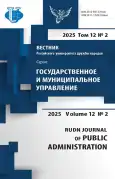Преподавание английского языка в контексте образовательной политики стран Совета cотрудничества арабских государств Персидского Залива
- Авторы: Саввин И.А.1, Дубинина Н.В.1
-
Учреждения:
- Российский университет дружбы народов
- Выпуск: Том 12, № 2 (2025)
- Страницы: 305-312
- Раздел: МЕЖДУНАРОДНЫЙ ОПЫТ ГОСУДАРСТВЕННОГО УПРАВЛЕНИЯ
- URL: https://journal-vniispk.ru/2312-8313/article/view/317850
- DOI: https://doi.org/10.22363/2312-8313-2025-12-2-305-312
- EDN: https://elibrary.ru/PPEVBQ
- ID: 317850
Цитировать
Аннотация
После обнаружения нефти в странах Персидского залива в них резко увеличилось число трудовых мигрантов, преимущественно из стран Южной и Юго-Восточной Азии, а также Африки. Это привело к усилению роли английского языка как языка межнационального общения, в т.ч. в сфере образования: сейчас значительное количество программ высшего образования в странах региона реализуется полностью на английском языке. Это объясняется рядом причин, в т.ч. значительным количеством иностранной (как квалифицированной, так и неквалифицированной) рабочей силы, а также стремлением лидеров стран региона превратить их в региональные и международные экономические и образовательные центры. Рассмотрена языковая политика стран Совета cотрудничества арабских государств Персидского Залива (ССАГПЗ) в сфере преподавания английского языка в учреждениях среднего и высшего образования. Отмечено, что существующие исследования, концентрируясь в основном на теме глобализации, мало внимания уделяют образовательной политике стран ССАГПЗ в области преподавания английского языка, поставлена цель - выявить особенности государственной политики арабских стран Персидского залива в области преподавания английского языка, а также установить факторы, влияющие на становление этой политики. В результате анализа законодательства и практических методов реализации языковой политики показана динамика в сфере преподавания английского языка в странах региона. Установлено: страны ССАГПЗ делают ставку на западные модели образования, в т.ч. англоязычное высшее образование, что приводит к ряду практических проблем, кроме того, руководство этих стран активно привлекают филиалы ведущих западных образовательных учреждений. Перспектива исследования состоит в сравнительном изучении образовательной политики других арабских стран, а также дальнейшем анализе тенденций преподавания английского языка в регионе. Исследование вносит вклад в изучение языковой политики арабских стран и будет полезно востоковедам-арабистам и специалистам по языковой политике.
Об авторах
Илья Александрович Саввин
Российский университет дружбы народов
Автор, ответственный за переписку.
Email: savvin_ia@pfur.ru
ORCID iD: 0009-0009-4801-2426
ассистент кафедры иностранных языков филологического факультета
Россия, 117198, Москва, ул. Миклухо-Маклая, д. 6Наталья Валентиновна Дубинина
Российский университет дружбы народов
Email: dubinina_nv@pfur.ru
ORCID iD: 0000-0002-9137-7334
SPIN-код: 7302-7650
Scopus Author ID: 57194497859
кандидат филологических наук, доцент кафедры иностранных языков филологического факультета
Россия, 117198, Москва, ул. Миклухо-Маклая, д. 6Список литературы
- Peters J. The Arab world handbook. London: Stacey International Publishers; 2005.
- Karmani S. Petro-linguistics: the emerging nexus between oil, English, and Islam. Journal of Language, Identity & Education. 2005;4(2):87–102. https://doi.org/10.1207/s15327701jlie0402_2
- Mansfield P. A history of the Middle East. London: Penguin; 2003. https://doi.org/10.2307/494097
- Ahmed K. English in the Arab Gulf. Journal of University Education. 2010;6(1):1–12.
- Wilkins K. Higher education reform in the Arab world. The brookings project on U.S. relations with the Islamic world: 2011 U.S.-Islamic world forum papers. Washington: Brookings Institute; 2011.
- Khoury IE. Building a foundation for success? Foundation programs in the Arab Gulf States using Qatar as a case study. In: Shah M, Whiteford G (eds). Bridges, pathways, and transitions: international innovations in widening participation. Cambridge: Chandos Publishing; 2017:141–155. https://doi.org/10.1016/b978-0-08-101921-4.00009-9
- Abou-El-Kheir A. Qatar’s K-12 education reform — a review of the policy decisions and a look to the future. Doha: OSF Preprints; 2017. https://doi.org/10.31219/osf.io/ckyrx
- Cooper W. How will the GCC close the skills gap? London: EY Building a Better Working World; 2015.
- Romanowski M, Alkhateeb H, Nasser R. Policy borrowing in the gulf cooperation council countries: cultural scripts and epistemological conflicts. International Journal of Educational Development. 2018;60:19–24. https://doi.org/10.1016/j.ijedudev.2017.10.021
- Rostron M. Liberal arts education in Qatar: intercultural perspectives. Intercultural Education. 2009;20(3):219–229. https://doi.org/10.1080/14675980903138517
- Coffman J. Higher education in the Gulf: privatization and Americanization. International Higher Education. 2003;33:17–19. https://doi.org/10.1163/9789087901035_059
- Yuksel D, Curle S, Altay M. Multilingual and translingual practices in English-medium instruction: Perspectives from global higher education contexts. London: Bloomsbury; 2024. https://doi.org/10.5040/9781350373273
- Larsen M. Internationalization of higher education: an analysis through spatial, network and mobilities theory. New York: Palgrave Macmillan; 2016.
- Gallagher K, Jones W. English-Medium instruction in the Arab Gulf States: Strategies needed to support the realisation of governmental visions for 2030 and beyond. In: Gallagher K., Jones W. (eds). English as a medium of instruction on the Arabian Peninsula. London: Routledge; 2023:19–39.
- Al-Mahrooqi R, Tuzlukova V. English communication skills and employability in the Arabian gulf: the case of Oman. Pertanika Journal of Social Sciences & Humanities. 2014;22(2):473–488.
- Baig F. A “Gift” of neoliberalism: English as the language of instruction in the GCC. Reconsidering Development. 2023;7(1):43–47.
- AlKhater LRM. Qatar’s borrowed K-12 education reform in context. In: Tok MN, Alkhater L, Pal LA (eds). Policy-making in a transformative state. The case of Qatar. London: Palgrave Macmillan; 2016:97–130. https://doi.org/10.1057/978-1-137-46639-6_4
Дополнительные файлы










